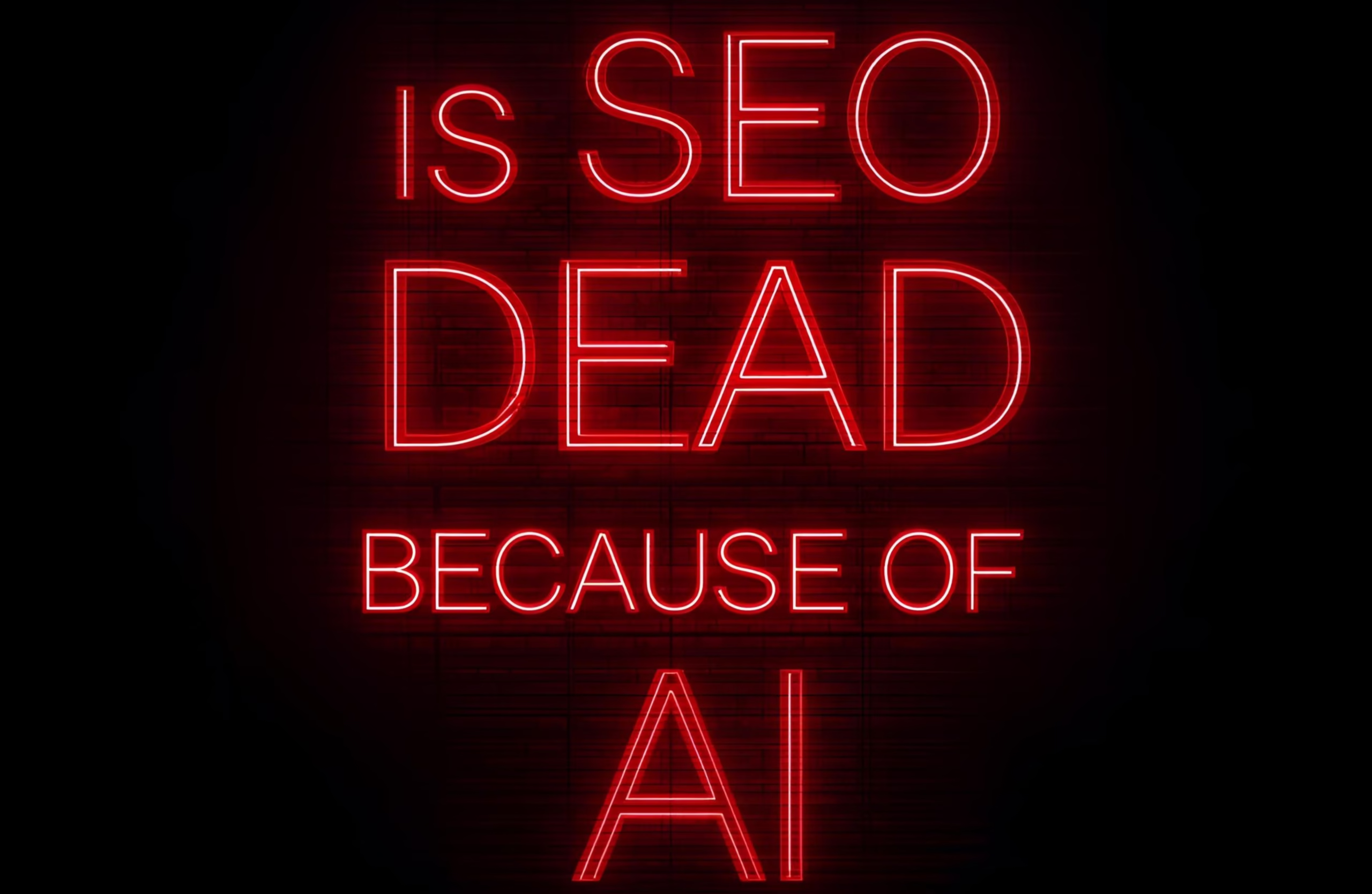“SEO is dead.” It’s a bold claim echoing across boardrooms, marketing forums, and social media debates fueled by the rapid rise of AI tools like ChatGPT and Google’s AI Overviews. The uncomfortable truth? AI is already changing how people search, discover, and consume information, leaving businesses to wonder if years of SEO effort will soon be irrelevant. Many are asking the uneasy question: Is SEO dead because of AI?
The answer isn’t as grim as it sounds. SEO isn’t dying, it’s transforming into something bigger: AEO (Answer Engine Optimization). To understand this shift, let’s unpack the concerns most business owners and marketers are grappling with right now.
Key Takeaways
- SEO is not dying; it’s evolving.
- How is AI affecting SEO? It has changed how & where people search, but visibility on Google and other platforms is still crucial for gaining real-time data.
- Clicks may reduce, but not for everything. Even if AI answers some questions, when users want to buy, book, or trust a brand, they still surf websites.
- User intent is shifting. Informational queries (e.g., “What is SEO?”) may get answered by AI. But transactional and commercial queries (e.g., “Buy a kaftan online”) still depend on websites.
- Content quality & authority matter more. Google+AI relies on trusted sources. Businesses with strong SEO, structured content, and authority will only win traffic.
- AI opens new opportunities. Featured snippets, People Also Ask, video carousels, and AI-driven summaries are new entry points for visibility.
- Local & niche SEO is stronger than ever. “Near me” searches, service providers, and local businesses still need optimized Google presence.
- Future SEO = Technical + Content + Experience. Core Web Vitals, structured data, and high-quality UX remain must-haves to stay relevant.
- AI will filter noise, not eliminate SEO. SEO experts who adapt will gain an edge, while those who fail to adapt will lose visibility.
Table of Contents
Why Do People Say SEO is Dying?
The prominent reason is the rise of AI-driven search. Google’s AI Overviews and AI tools (that have started acting as a search engine) often give answers directly on the search results page.
This makes many people wonder: “Is SEO dead because of AI?”
For example, if someone searches “How many calories are in an apple?”, Google’s AI may directly show the answer. That reduces the need to visit a nutrition blog.
This leads to fear that clicks and, therefore, SEO will disappear.
Is Google Traffic Really Dropping by 80%?
Not exactly. This is an oversimplification.
Yes, for basic informational queries, clicks are reducing, which makes people ask: “Does AI reduce Google traffic?”
But for commercial, local, or transactional searches like “Best orthopedic hospital in Pune” or “Buy organic tea online”, users still need to visit a website to make a purchase, book a service, or get contact details.
So, traffic intent may shift, but it won’t vanish.
What Type of Searches Are Safe from AI?
Not all queries are the same. Here’s how AI impacts them:
- Informational searches – More AI answers, fewer clicks.
- Local searches – Still depend on Google Maps, GMB profiles, and websites.
- Product/service searches – Users need detailed product info, reviews, and purchase options.
- High-trust niches (health, finance, legal) – People verify info from real websites due to trust and authority concerns.
So while some ask “Is SEO dead because of AI?”, the truth is SEO remains highly relevant in local, transactional, and trust-heavy niches.
Will AI Replace Human-Written Content for SEO?
AI can generate basic, generic content fast. But how is AI affecting SEO content? It’s making businesses rethink strategies.
SEO is not just about content; it’s about expertise, trust, authority, and strategy. AI is still far from creating brand authority.
AI-generated content lacks a human touch. Search engines push the E-E-A-T model (Experience, Expertise, Authoritativeness, Trustworthiness). Real brands with unique perspectives will win.
How Does AI Actually Help SEO?
Rather than killing SEO, AI can make SEO stronger:
- AI helps identify high-ranking keywords faster.
- AI tools assist in seamless competitor analysis.
- AI chatbots and content generators speed up the initial drafting of descriptions and blogs.
- AI analytics enhances search intent understanding.
So instead of asking “Will AI kill SEO?”, businesses should focus on leveraging AI as a supportive tool for SEO.
What Should Businesses Do to Survive in the AI + SEO Era?
Here are actionable strategies:
- Optimize for AEO & GEO.
- Use schema markup, FAQ sections, and structured data.
- Include direct, clear answers to common questions.
- Strengthen Local SEO with reviews and “near me” keywords.
- Lay authoritative foundations with the E-E-A-T model.
- Showcase credentials, case studies, and testimonials.
- Publish research-backed, expert content.
- Focus on in-depth, niche-specific content.
- Create content that AI cannot easily summarize (like detailed guides, comparisons, and unique case studies).
- Blend organic ways with paid methods. Since AI may reduce some organic clicks, combine SEO with Google Ads + Meta Ads for full-funnel growth.
So, Is SEO Really Dying?
No. SEO is changing its shape.
SEO has been “dying” in the news for the past 10 years, but it never actually died! It only goes on evolving.
10 years ago, people said SEO was dead because of Google Ads.
5 years ago, they said SEO was dead because of Voice Search.
Today, the question is “Is SEO dead because of AI?”
And yet, SEO has only grown stronger by adapting.
Yes, we’ll see fewer clicks on simple queries.
But businesses that invest in quality, authority, and local relevance will continue to thrive.
SEO is not dying. SEO is evolving.
Those who adapt will not just survive, they’ll win.
Pro Tip: If you’re a business owner, don’t cut SEO budgets because of AI fears. Instead, work with teams who know how to align SEO with AI-driven search.
Final Thoughts
We must always keep our eyes open to changes and adapt quickly – that has always been the key to SEO success.
In the AI era, changes are happening faster than ever before. The real question is not “Is SEO dead because of AI?” but “How is AI affecting SEO, and how can businesses adapt?”
In the future, SEO may shape itself in new ways we cannot yet predict. But one thing is certain: this is not the end of SEO, it’s the beginning of a new SEO journey, where SEO will be focused and optimized for AI. That’s where AEO will be coming into frame.
Stay connected with experts, embrace change, and you’ll continue to enjoy the benefits of visibility, traffic, and growth.
Remember: Adaptability is the Real SEO Superpower!
At Digicompanions, we help brands stay ahead in this fast-changing digital era with AI-driven SEO and AEO strategies. Let’s shape the future of your online growth together – connect with us today!
See How DigiCompanions Can Drive More Traffic to Your Website
SEO – Unlock more organic traffic with data-driven SEO strategies. See real results.
Digital Marketing – Maximize ROI with tailored paid media strategies and growth-driven campaigns.
FAQs
No. SEO is not dying, it’s evolving. AI may reduce clicks on simple informational searches, but businesses still rely on SEO for transactional, commercial, and local queries where trust and authority matter.
AI is changing search behavior by answering simple questions directly. To adapt, businesses must focus on E-E-A-T (Experience, Expertise, Authoritativeness, Trustworthiness), schema markup, and AI-friendly structured content.
No. AI can speed up keyword research, content drafting, and competitor analysis, but it cannot replace human expertise, brand storytelling, and authority-building.
Not significantly. Local searches still rely heavily on Google Maps, GMB profiles, and websites. AI may summarize options, but customers still visit websites or make calls before booking services.
In-depth guides, expert opinions, niche-specific content, comparisons, and case studies – essentially, content that AI cannot fully summarize. High-trust industries (health, finance, law) especially require human-backed expertise.
No. Cutting SEO budgets is a mistake. Instead, businesses should adapt by investing in AI-friendly SEO strategies, structured content, and a mix of SEO + paid ads for stronger visibility.
By providing clear, direct answers to common questions, using structured data/schema, and including FAQ sections. This increases the chance of being featured in AI summaries and featured snippets.


